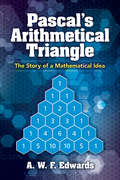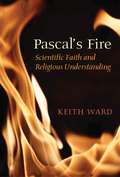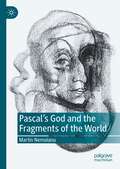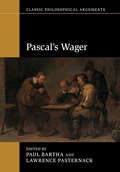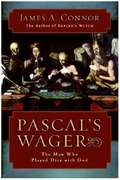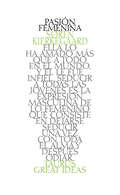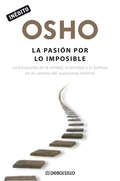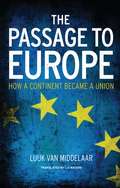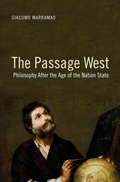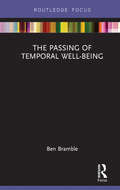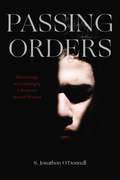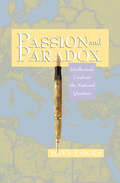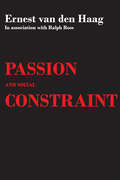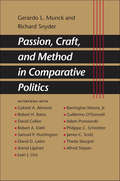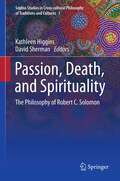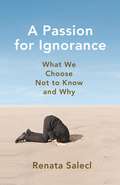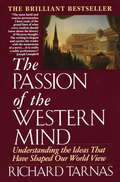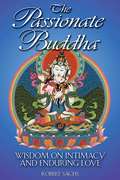- Table View
- List View
Pascal's Arithmetical Triangle: The Story of a Mathematical Idea (Dover Books on Mathematics)
by A.W.F. EdwardsThis survey explores the history of the arithmetical triangle, from its roots in Pythagorean arithmetic, Hindu combinatorics, and Arabic algebra to its influence on Newton and Leibniz as well as modern-day mathematicians.
Pascal's Fire: Scientific Faith and Religious Understanding
by Keith WardCombining cutting edge-science with thought-provoking discourses about morality, religion and the meaning of life, Keith Ward provides a fascinating take on the science versus religion debate, offering 'a third way' which is guaranteed to spark debate for years to come.
Pascal's God and the Fragments of the World
by Martin NemoianuIn Pascal's God and the Fragments of the World, Martin Nemoianu offers a new interpretation of the thought of Blaise Pascal, drawn from the Pensées and beyond. The book takes Pascal's central theme to be the distinction - Infini rien - between the transcendent God and the created world, which, without God, would be nothing. Nemoianu identifies the distinction in Pascal, articulates it, and works through the difficulties attending the distinction's disclosure. He then considers the implications of the distinction for the nature of nature and the nature of the human being, culminating in the ideal of martyrdom. The book closes with treatment of a closely related theme: the relation between human freedom and divine grace, in the context of the vexed question of Pascal's Jansenism.
Pascal's Wager (Classic Philosophical Arguments)
by Paul Bartha Lawrence PasternackIn his famous Wager, Blaise Pascal (1623–62) offers the reader an argument that it is rational to strive to believe in God. Philosophical debates about this classic argument have continued until our own times. This volume provides a comprehensive examination of Pascal's Wager, including its theological framework, its place in the history of philosophy, and its importance to contemporary decision theory. The volume starts with a valuable primer on infinity and decision theory for students and non-specialists. A sequence of chapters then examines topics including the Wager's underlying theology, its influence on later philosophical figures, and contemporary analyses of the Wager including Alan Hájek's challenge to its validity, the many gods objection, and the ethics of belief. The final five chapters explore various ways in which the Wager has inspired contemporary decision theory, including questions related to infinite utility, imprecise probabilities, and infinitesimals.
Pascal's Wager: The Man Who Played Dice with God
by James A. ConnorJames Connor explores both the intellectual giant whose theory of probability paved the way for modernity and the devout religious mystic who dared apply probability to faith.
Pasión femenina (Serie Great Ideas #38)
by Soren Kierkegaard40 grandes ideas que han cambiado el mundo. Kierkegaard, a quien a veces se ha tachado de misógino, tenía una concepción elevada del alma femenina. En estos textos, con un trasfondo de crítica social, el filósofo de la angustia nos brinda un fino análisis estético de la aflicción a través de diversas figuras femeninas (una Antígona moderna, María Beaumarchais, Doña Elvira y Margarita). A lo largo de la historia, algunos libros han cambiado el mundo. Han transformado la manera en que nos vemos a nosotros mismos y a los demás. Han inspirado el debate, la discordia, la guerra y la revolución. Han iluminado, indignado, provocado y consolado. Han enriquecido vidas, y también las han destruido. Taurus publica las obras de los grandes pensadores, pioneros, radicales y visionarios cuyas ideas sacudieron la civilización y nos impulsaron a ser quienes somos. La crítica ha dicho sobre la colección «Great Ideas»...«Un fenómeno editorial.»The Guardian
Pasión por lo imposible
by Osho OshoConsiderado un gurú del siglo XX, las enseñanzas de Osho (1931-1990) han sido recogidas a lo largo de una extensa obra. Este volumen es un compendio de todas las técnicas de Osho -debidamente sistematizadas- para potenciar el crecimiento personal y para hallar el camino que conduce a la verdad.
Pasiones terrenas: Amor y literatura en tiempos de lucha revolucionaria
by Maximiliano CrespiAvatares amorosos y vida intelectual de los principales pensadores y agitadores de la izquierda mundial: Marx, Lenin, Luxemburg, Gramsci, Benjamin, Althusser, Gorz. Karl Marx solía decir que la filosofía y la historia, el pensamiento y la vida en común eran sus pasiones terrenas. Cómo en su caso, en la trama íntima de afectos, amores y desengaños de Lenin, Rosa Luxemburg, Walter Benjamin, Antonio Gramsci, Louis Althusser y André Gorz es posible rastrear y analizar sus ideas y acciones. Pasiones terrenas echa luz al corazón de estos pensadores esenciales y de ese prisma surgen, como rayos, lecturas inesperadas. Entregados al sueño persistente de la Revolución, esos espíritus encuentran en Maximiliano Crespi un demiurgo atento al pulso romántico y sexual, dulce y violento que los animaba. Con un abordaje originalísimo, este ensayo recupera, a partir de cartas, biografías, testimonios, memorias y documentos, el rol fundamental de las mujeres en la historia de las ideas de izquierda. Invisibilizadas hasta ahora, las relaciones íntimas con esposas, amantes y compañeras permiten la comprensión de las derivas teóricas y estimulan la reinterpretación de los derroteros intelectuales y existenciales de estos siete pensadores fundamentales del marxismo occidental.
Pasquinade in E: Slaughtering Some Sacred Cows
by Gilles PaquetPasquinade is a satire or critical comment traditionally posted in a public place in ancient Rome; in particular, on the statue of Pasquino. Pasquinades in E is Gilles Paquet’s contribution to this waning tradition. These essays are exercises in critical thinking. They aim to exorcise a number of mental prisons about aspects of governing, and at denouncing pathologies in our ways of thinking and governing ourselves, by exposing their toxic nature. Silence on such matters connotes tacit agreement with toxic nonsense and, therefore, guilt by association for the ensuing mal-governance.
The Passage to Europe: How a Continent Became a Union
by Luuk Van MiddelaarAs financial turmoil in Europe preoccupies political leaders and global markets, it becomes more important than ever to understand the forces that underpin the European Union, hold it together and drive it forward. This timely book provides a gripping account of the realities of power politics among European states and between their leaders. Drawing on long experience working behind the scenes, Luuk van Middelaar captures the dynamics and tensions shaping the European Union from its origins until today. It is a story of unexpected events and twists of fate, bold vision and sheer necessity, told from the perspective of the keyplayers - from de Gaulle to Havel, Thatcher to Merkel. Van Middelaar cuts through the institutional complexity by exploring the unforeseen outcomes of decisive moments and focusing on the quest for public legitimacy. As a first-hand witness to the day-to-day actions and decisions of Europe's leaders, the author provides a vivid narrative of the crises and compromises that united a continent. By revisiting the past, he sheds fresh light on the present state of European unification and offers insights into what the future may hold.
The Passage West
by Giacomo MarramaoIn this ambitious work, Giacomo Marramao proposes a radical reconceptualization of the world system in our era of declining state sovereignty. He argues that globalization cannot be reduced to mere economics or summarized by phrases such as 'the end of history' or the 'westernization of the world'. Instead, we find ourselves embarking on a passage to a new, post-nation state age destined to transform all civilizations - and to disrupt Western geopolitical dominance. To confront the challenges of this interregnum one must think in terms of a new and radical universalism, a universalism of difference able to revitalize politics and to demythologize identity.Building on the great interwar discussion between Spengler, Junger, Schmitt and Heidegger, Marramao's new work engages with Habermas, Derrida and post-colonialism. Arguing against the classic Western pretension to universal norms of democracy and reason, he develops instead the idea of a 'universal politics of difference'
The Passing of Temporal Well-Being (Routledge Focus on Philosophy)
by Ben BrambleThe philosophical study of well-being concerns what makes lives good for their subjects. It is now standard among philosophers to distinguish between two kinds of well-being: · lifetime well-being, i.e., how good a person’s life was for him or her considered as a whole, and · temporal well-being, i.e., how well off someone was, or how they fared, at a particular moment in time (momentary well-being) or over a period of time longer than a moment but shorter than a whole life, say, a day, month, year, or chapter of a life (periodic well-being). Many theories have been offered of each of these kinds of well-being. A common view is that lifetime well-being is in some way constructed out of temporal well-being. This book argues that much of this literature is premised on a mistake. Lifetime well-being cannot be constructed out of temporal well-being, because there is no such thing as temporal well-being. The only genuine kind of well-being is lifetime well-being. The Passing of Temporal Well-Being will prove essential reading for professional philosophers, especially in moral and political philosophy. It will also be of interest to welfare economists and policy-makers who appeal to well-being
Passing Orders: Demonology and Sovereignty in American Spiritual Warfare
by S. Jonathon O'DonnellDemonization has increasingly become central to the global religious and political landscape. Passing Orders interrogates this centrality through an analysis of evangelical “spiritual warfare” demonologies in contemporary America. Situating spiritual warfare as part of broader frameworks of American exceptionalism, ethnonationalism, and empire management, author S. Jonathon O’Donnell exposes the theological foundations of the systems of queer- and transphobia, anti-blackness, Islamophobia, and settler colonialism that justify the dehumanizing practices of the current U.S. political order.O’Donnell argues that demonologies are not only tools of dehumanization but also ontological and biopolitical systems that create and maintain structures of sovereign power, or orthotaxies—models of the “right ordering” of space, time, and bodies that stratify humanity into hierarchies of being and nonbeing. Alternative orders are demonized as passing, framed as counterfeit, transgressive, and transient. Yet these orders refuse to simply pass on, instead giving strength to deviant desires that challenge the legitimacy of sovereign violence. Critically examining this challenge in the demonologies of three figures—Jezebel, the Islamic Antichrist, and Leviathan—Passing Orders re-imagines demons as a surprising source of political and social resistance, reflecting fragile and fractious communities bound by mutual passing and precarity into strategic coalitions of solidarity, subversion, and survival.
Passion and Paradox: Intellectuals Confront the National Question
by Joan CocksFrom Kosovo to Québec, Ireland to East Timor, nationalism has been a recurrent topic of intense debate. It has been condemned as a source of hatred and war, yet embraced for stimulating community feeling and collective freedom. Joan Cocks explores the power, danger, and allure of nationalism by examining its place in the thought of eight politically engaged intellectuals of the nineteenth and twentieth centuries: the antagonist of capital, Karl Marx; the critics of imperialism Rosa Luxemburg, Hannah Arendt, and Frantz Fanon; the liberal pluralist Isaiah Berlin; the neonationalist Tom Nairn, and the post-colonial writers, V. S. Naipaul and Edward Said. Cocks not only sheds new light on the complexities of nationalism but also reveals the tensions that have inspired and troubled intellectuals who have sought to lead lives between detached criticism and political passion. In lively, conversational prose, Cocks assesses their treatment of questions such as the mythology of national identity, the right to national self-determination, and the morality of nationalist violence. While ultimately critical of nationalism, she engages sympathetically even with its defenders. By illuminating the links that distinguished minds have drawn between thought and action on nationalism in politics, this stimulating work provides a rich foundation from which we ourselves might think or act more wisely when confronting a phenomenon that, in fundamental and perplexing ways, has shaped our world.
Passion and Social Constraint
by Ralph RossIn intellectual and academic circles, Ernest van den Haag was respected for his brilliant mind, his outspoken and often highly controversial assertions, and a very unacademic, sharp, biting style.
Passion, Craft, and Method in Comparative Politics
by Gerardo L. Munck Richard SnyderIn the first collection of interviews with the most prominent scholars in comparative politics since World War II, Gerardo L. Munck and Richard Snyder trace key developments in the field during the twentieth century. Organized around a broad set of themes—intellectual formation and training; major works and ideas; the craft and tools of research; colleagues, collaborators, and students; and the past and future of comparative politics—these in-depth interviews offer unique and candid reflections that bring the research process to life and shed light on the human dimension of scholarship. Giving voice to scholars who practice their craft in different ways yet share a passion for knowledge about global politics, Passion, Craft, and Method in Comparative Politics offers a wealth of insights into contemporary debates about the state of knowledge in comparative politics and the future of the field.
Passion, Death, and Spirituality
by David Sherman Kathleen HigginsRobert C. Solomon, who died in 2007, was Professor of Philosophy and Quincy Lee Centennial Professor of Business at the University of Texas, USA. As the first book comprehensively to examine the breadth of Solomon's contribution to philosophy, this volume ranks as a vital addition to the literature. It includes a newly published transcript of Solomon's last talk, which responded to Arindam Chakrabarti on the concept of revenge, as well as the considered views of prominent figures in the numerous subfields in which Solomon worked. The content analyses his perspectives on the philosophy of emotion, virtue, business ethics, and religion, in addition to philosophical history, existentialism, and the many other topics that held this prolific thinker's attention. Solomon memorably defined philosophy itself as 'the thoughtful love of life', and despite the diversity of his output, he was most drawn by central questions about the meaning of life, the essential role that emotions play in finding that meaning, and the human imperative to seek 'emotional integrity', in which one's thoughts, emotions, and actions all contribute to a coherent narrative. The essays included here draw attention to the interconnections between the issues Solomon addressed, and evince the manner in which he embodied that integrity, living a life at one with his philosophy. They emphasize the central themes of passion, ethics, and spirituality, which threaded through his work, and the way these ideas informed his views on how we should approach grief and death. The multiplicity of topics alone make this keystone work an enlightening read for a full spectrum of students of philosophy, providing much to ponder and recounting a subtle and shining example of the emotional integrity Solomon worked so hard to define.
A Passion for Democracy: American Essays
by Benjamin R. BarberBenjamin Barber is one of America's preeminent political theorists. He has been a significant voice in the continuing debate about the nature and role of democracy in the contemporary world. A Passion for Democracy collects twenty of his most important writings on American democracy. Together they refine his distinctive position in democratic theory. Barber's conception of "strong democracy" contrasts with traditional concepts of "liberal democracy," especially in its emphasis on citizen participation in central issues of public debate. These essays critique the "thin representation" of liberal democracy and buttress the arguments presented in Barber's twelve books, most recently in his well-received Jihad vs. McWorld: How Globalism and Tribalism Are Re-shaping the World. In these pieces, Barber argues for participatory democracy without dependence on abstract metaphysical foundations, and he stresses the relationship among democracy and civil society, civic education, and culture. A Passion for Democracy is divided into four sections. In the first, "American Theory: Democracy, Liberalism, and Rights," Barber addresses issues of ongoing relevance to today's debates about the roots of participatory democracy, including individualism vs. community, the importance of consent, and the irrelevance of Marxism. Essays in the second section, "American Practice: Leadership, Citizenship, and Censorship" provide a "strong democracy" critique of American democratic practice. "Education for Democracy: Civic Education, Service, and Citizenship" applies Barber's theories to three related topics and includes his much-discussed essay "America Skips School." The final section, "Democracy and Technology: Endless Frontier or End of Democracy?" provides glimpses into a future that technology alone cannot secure for democracy. In his preface, Barber writes: "In these essays ... I have been hard on my country. Like most ardent democrats, I want more for it than it has achieved, despite the fact that it has achieved more than most people have dared to want." This wide-ranging collection displays not only his passion for democracy, but also his unique perspective on issues of abiding importance for the democratic process.
A Passion for Ignorance: What We Choose Not to Know and Why
by Renata SaleclAn original and provocative exploration of our capacity to ignore what is inconvenient or traumaticIgnorance, whether passive or active, conscious or unconscious, has always been a part of the human condition, Renata Salecl argues. What has changed in our post-truth, postindustrial world is that we often feel overwhelmed by the constant flood of information and misinformation. It sometimes seems impossible to differentiate between truth and falsehood and, as a result, there has been a backlash against the idea of expertise, and a rise in the number of people actively choosing not to know. The dangers of this are obvious, but Salecl challenges our assumptions, arguing that there may also be a positive side to ignorance, and that by addressing the role of ignorance in society, we may also be able to reclaim the role of knowledge.Drawing on philosophy, social and psychoanalytic theory, popular culture, and her own experience, Salecl explores how the passion for ignorance plays out in many different aspects of life today, from love, illness, trauma, and the fear of failure to genetics, forensic science, big data, and the incel movement—and she concludes that ignorance is a complex phenomenon that can, on occasion, benefit individuals and society as a whole.The result is a fascinating investigation of how the knowledge economy became an ignorance economy, what it means for us, and what it tells us about the world today.
A Passion for Ignorance: What We Choose Not to Know and Why
by Renata SaleclAn original and provocative exploration of our capacity to ignore what is inconvenient or traumaticIgnorance, whether passive or active, conscious or unconscious, has always been a part of the human condition, Renata Salecl argues. What has changed in our post-truth, postindustrial world is that we often feel overwhelmed by the constant flood of information and misinformation. It sometimes seems impossible to differentiate between truth and falsehood and, as a result, there has been a backlash against the idea of expertise, and a rise in the number of people actively choosing not to know. The dangers of this are obvious, but Salecl challenges our assumptions, arguing that there may also be a positive side to ignorance, and that by addressing the role of ignorance in society, we may also be able to reclaim the role of knowledge.Drawing on philosophy, social and psychoanalytic theory, popular culture, and her own experience, Salecl explores how the passion for ignorance plays out in many different aspects of life today, from love, illness, trauma, and the fear of failure to genetics, forensic science, big data, and the incel movement—and she concludes that ignorance is a complex phenomenon that can, on occasion, benefit individuals and society as a whole.The result is a fascinating investigation of how the knowledge economy became an ignorance economy, what it means for us, and what it tells us about the world today.
Passion in Theory: Conceptions of Freud and Lacan (Warwick Studies in European Philosophy)
by Robin FerrellPhilosophy had either ignored or attacked psychoanalysis: such responses are neither warranted nor helpful. One hundred years after its inception, isn't it time to find out what psychoanalysis has to offer us? In Passion in Theory Robyn Ferrell does just that, and returns with some surprising answers. Concentrating on the work of Freud and Lacan, Robyn Ferrell asks why their work had been so influential in European philosophy yet so marginal in the Anglo-American circles. Passion in Theory explores their conception of the relationship between mind and body, and how it provides a key to many current philosophical questions. Passion in Theory is designed for students and researchers in psychoanalysis, traditional and continental philosophy.
Passion of the Western Mind: Understanding the Ideas That Have Shaped Our World View
by Richard Tarnas"[This] magnificent critical survey, with its inherent respect for both the 'Westt's mainstream high culture' and the 'radically changing world' of the 1990s, offers a new breakthrough for lay and scholarly readers alike....Allows readers to grasp the big picture of Western culture for the first time."SAN FRANCISCO CHRONICLE. Here are the great minds of Western civilization and their pivotal ideas, from Plato to Hegel, from Augustine to Nietzsche, from Copernicus to Freud. Richard Tarnas performs the near-miracle of describing profound philosophical concepts simply but without simplifying them. Ten years in the making and already hailed as a classic, THE PASSION OF THE WESTERN MIND is truly a complete liberal education in a single volume.
Passion To Oppose: John Anderson, philosopher
by Brian KennedyJohn Anderson was Australia's most important philosopher in the first half of this century. The young Scotsman held the chair of philosophy at the University of Sydney for thirty years until retirement in 1958. He developed his own distinctive system of realism and fathered a vigorous local school characterised by inquiry, independence and a deep commitment to philosophy as a way of life. He was a formidable public figure and fierce controversialist who outraged many of Sydney's conventionally minded. From an early Marxist phase, he opposed all forms of censorship and mind control. This first biography of Anderson is no hagiography, containing much new material about Anderson's Scottish past and his conflicted public and private life. His relations with students were complex; with women, they were decidedly problematic. In the aftermath of a pragmatic revolution that has swept our universities and colleges, Anderson;s uncompromising calls to unfettered inquiry, and the Socratic way of life are timely.
The Passionate Buddha: Wisdom on Intimacy and Enduring Love
by Robert SachsDiscusses the Buddhist meaning of true love and how to attain it in the modern world.• Interweaves Tantric Buddhist teachings with modern concerns such as monogamy and contraception. • Gives a holistic view of a healthy relationship, from physical pleasure to emotional connections and spiritual transformation. • Discusses love in the broader Buddhist concepts of karma and reincarnation. Beginning his book with the ringing question "what are you waiting for?" Robert Sachs goes on to interweave traditional Buddhist thought with the concerns of the modern couple. Using clear, playful language, Sachs describes the different aspects of healthy relationships within a Buddhist context. However, rather than just setting an ideal, he clarifies how Buddhist practices not only can be integrated into a modern lifestyle but also can be powerful tools for the many changes that occur in any loving relationship. Sachs also considers the role of each individual in a relationship, showing that a couple may develop or possess qualities of being an indivisible unit, but that where the real work lies is when two people are committed to grow and change with one another. He offers techniques for finding oneself both in and out of a relationship and ideas on how to deal with anger and other emotions that arise in the course of life, emotions that occur most intensely over the course of an intimate relationship. The Passionate Buddha acts as a guide for all of those "fumbling toward ecstasy" in today's confusing world of relationships.
Passionate Declarations: Essays on War and Justice
by Howard ZinnFrom the bestselling author of A People's History of the United States comes this selection of passionate, honest, and piercing essays looking at American political ideology. Howard Zinn brings to Passionate Declarations the same astringent style and provocative point of view that led more than a million people to buy his book A People's History of the United States. He directs his critique here to what he calls "American orthodoxies" -- that set of beliefs guardians of our culture consider sacrosanct: justifications for war, cynicism about human nature and violence, pride in our economic system, certainty of our freedom of speech, romanticization of representative government, confidence in our system of justice. Those orthodoxies, he believes, have a chilling effect on our capacity to think independently and to become active citizens in the long struggle for peace and justice.
